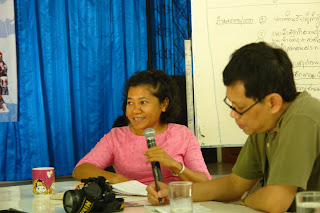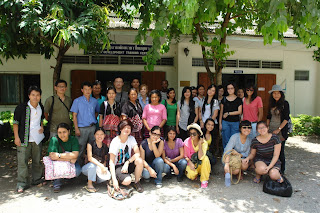Our trip to IMPECT (Inter Mountain Peoples Education and Culture in Thailand Association) has shed light on the collision of traditional tribal life and nation building agenda of Thailand. Although not an NGO, IMPECT is instead a unique association for indigenous inter mountain peoples residing in the highlands of northern Thailand – namely the Akha, Hmong, Lahu, Lisu, Lua, Karen and Mien tribes.
IMPECT strives to provide opportunities for different indigenous and tribal people to implement “traditional knowledge in sustainable development”, Anchalee explains. As the resident translator, Anchalee translates for Boonyong, who explains that IMPECT consists of more than 3,000 members from 10 different ethnic groups. Representatives are chosen from each ethnic group, in which 1 man and 1 woman are chosen to join the executive committee.
 Anchalee, our translator and staff of IMPECT and Dr. Yeoh
Anchalee, our translator and staff of IMPECT and Dr. YeohThey have three main programs; the ethnic community and network development program, support network program and the international cooperation and ethnic networks development program.
IMPECT explained to us two major issues currently concerning the indigenous communities; education and natural resource management.
Although education is highly valued by both views, the national Thai curriculum finds itself at odds with the tradition-based curriculum taught in the schools for indigenous communities. One of the main problems of implementing the broad national curriculum includes issues of language, a barrier that prevents students from communicating with educators and thus their ability to excel in school; many of the teachers trained to teach the national curriculum are mainly Thai speaking and so cannot communicate in the mother tongues of their students.

A member of IMPECT who is of Karen group and Boonyong, another presenter who is from the Mien group
This in turn affects the quality of studies between the highland and lowland communities as teachers who are stationed in the highlands, do not stay for very long and once they are able develop along with the students, they leave the school, leaving students to start all over again with a replacement teacher who is unable to communicate with the students. This is highly disruptive for the smooth flowing of a stable learning environment.
IMPECT thus tries to integrate traditional practices within their school curriculum, such as promoting plurality of languages, speaking both their mother tongues and Thai, also English. This will allow the younger generation to connect with both their heritage and the wider Thai society.
From our time talking to IMPECT, we have seen the way education can be a destructive force for indigenous communities who do not fit into Thai nationalist agendas in promoting the language and identity.

In IMPECT
Another issue concerning IMPECT is the Highland community’s natural resource management, headed by the Highland Mapping Development and Biological Management Project. It seeks to support the community through their involvement in the mapping program whereby indigenous tribes work together with mapping officers to combine ancient mapping techniques with modern GIS (Geographical Information’s Systems) technology.
The national parks created by the Thai Government for environmental preservation often envelopes tribal land that is fertile ground to grow crops and grounds allocated for rituals, thus forcing them to relocate to areas that are not sustainable to their traditional practices. Thus one of the many objectives of IMPECT is to allow the communities to preserve the rights to their land which enables indigenous communities to have the technology like GIS to be able to map their natural resources while simultaneously using their knowledge to claim their rightful land and classify their lands accordingly.
“The GIS mapping system, although accepted by the government, is still not accepted by the national park officials” explains Anchalee, depriving the indigenous people’s rights to their own land. While IMPECT cannot implement the use of GIS with other communities, they can work on the 6 indigenous groups and 15 other smaller communities involved.
Overall, it can be said that IMPECT’s main hope and objective is to show that the way of the indigenous people is to be accepted and not destroyed.

All of us with IMPECT staff after the presentation

No comments:
Post a Comment